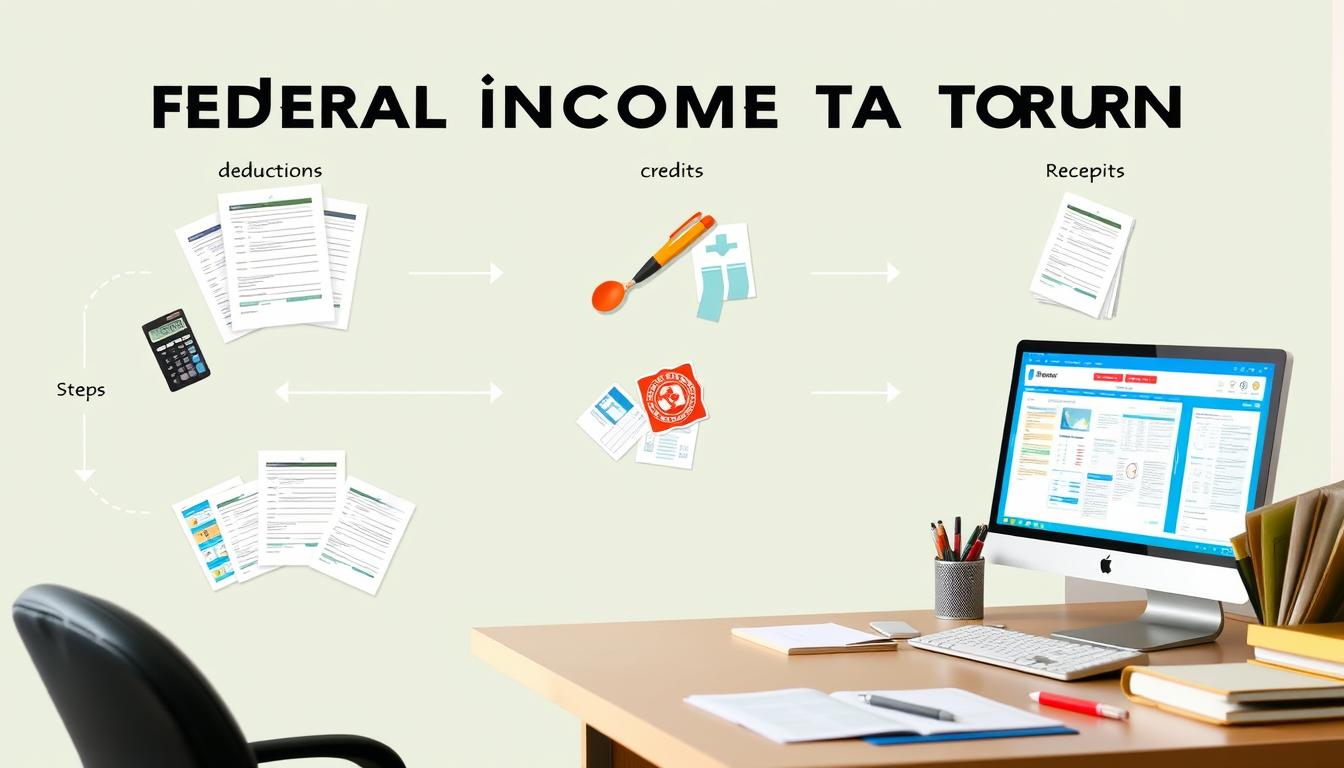Yes, you can pay property taxes with a credit card in many areas. However, be prepared for additional fees, usually ranging from 1.8% to 2.5% of your payment amount. Most local tax offices provide online payment portals that accept major credit cards like Visa, MasterCard, and American Express. Just make sure to check your local regulations, as acceptance policies can vary. Don't forget to gather necessary information like your property tax account number before you start. Stick around for tips on managing those fees and choosing the best payment method.
Key Takeaways
- Many local tax offices allow credit card payments for property taxes, but policies vary by jurisdiction.
- Credit card payments typically incur fees ranging from 1.8% to 5% of the transaction amount.
- Payment limits exist; for instance, some jurisdictions cap credit card transactions at $99,999.99.
- It's essential to verify acceptance and specific rules with your local tax collector before making a payment.
- Alternative payment methods, like e-checks, may be fee-free and worth considering to avoid additional costs.
Overview of Payment Methods
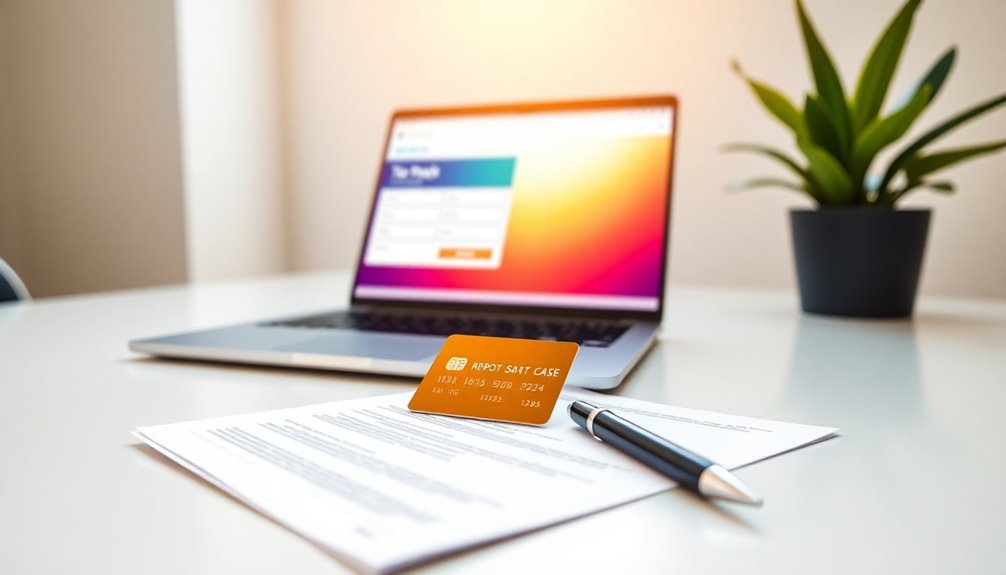
When it comes to paying property taxes, you have several convenient options to choose from. One popular method is online payments, where you can use credit or debit cards, or even e-checks. Credit card payments are not accepted via mail, so be sure to utilize online or in-person options for that method.
Remember, e-checks come with no service fees, while credit/debit card transactions incur a fee of 2.22% or a minimum of $1.49. You can make payments online 24/7 until 11:59 p.m. Pacific Time on the delinquency date, but you'll need your Assessor's Identification Number (AIN) to complete the transaction.
If you prefer traditional methods, you can mail your payment using a check, money order, or cashier's check. Just ensure your remittance is in U.S. dollars and drawn on a U.S. bank.
Be aware that postdated checks won't be held.
For those who want to pay in person or by phone, you can use checks, money orders, or major credit/debit cards at designated locations. Phone payments are also possible but limited to $99,999.99, including service fees.
Always have your AIN handy for these transactions. Each method offers flexibility to suit your needs!
Credit Card Acceptance
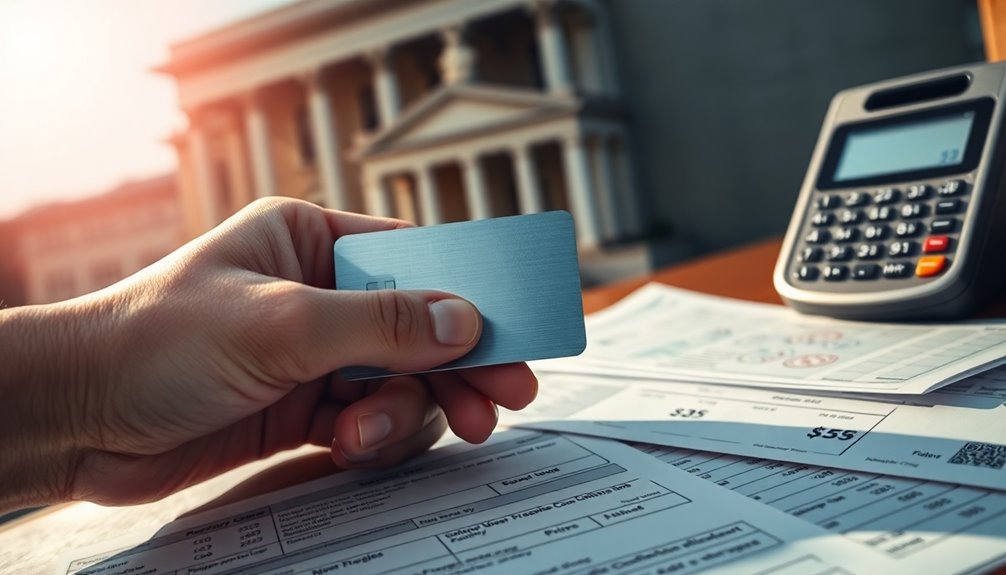
In recent years, many local tax offices have embraced credit card payments, offering convenience for property owners.
You'll often find online payment portals provided by these offices, which typically require specific payment processors like ACI Payments or Official Payments. Most major credit cards, including American Express, MasterCard, Discover, and Visa, are usually accepted.
To complete your payment, you'll need your property tax account number and some identifying information, all of which can be found on your local tax authority's website.
In some cases, local authorities may work with third-party payment processors, each having its own fees and acceptance criteria. When making payments, be sure to follow the specific instructions provided by the processor.
Some counties also allow phone payments using a jurisdiction code, although in-person payments are generally limited to cash or checks.
It's important to note that credit card acceptance varies by county or municipality. Not every location allows credit card payments, so always verify whether your local office accepts them. Additionally, there may be limits on the amount you can pay using a credit card, with security measures in place to ensure safe transactions. Some local offices may also allow you to meet spending requirements for credit card rewards, giving you added incentive to use this payment method.
Fees for Credit Card Payments
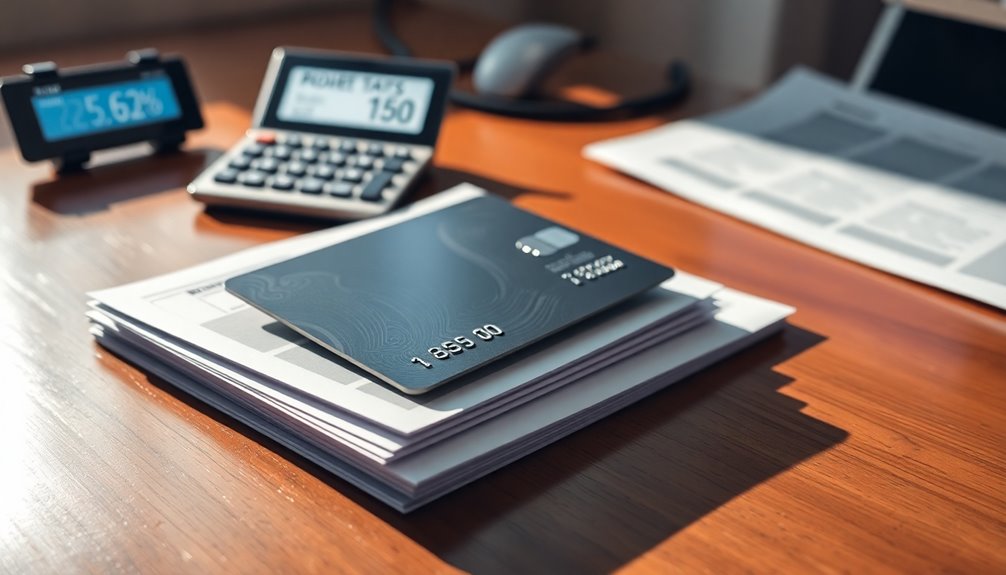
The cost of convenience often comes with fees that can add up quickly when you pay your property taxes with a credit card. Typically, these fees range from 1.8% to 2.5% of your payment amount. For instance, if your property tax bill is $5,000, you could face an extra $90 to $125 in fees.
Many providers impose minimum fees too, such as $1.95 or $1.49 per transaction. Different processors have varying fee structures. MuniciPay charges a 2.4% fee with a $2.00 minimum, while Wells Fargo has a 2.20% convenience fee for each card payment.
Services like Kasheesh might charge around 2%, but they often run promotional events that can lower or eliminate fees altogether. Keep in mind that these transaction fees appear as separate charges on your statement and don't benefit your tax department; they simply cover the card services provider's costs.
Also, transaction limits can apply, sometimes capping payments at $99,999.99. If you're looking to save on fees, consider alternatives like debit card payments, which generally have lower fees.
Processing Payments
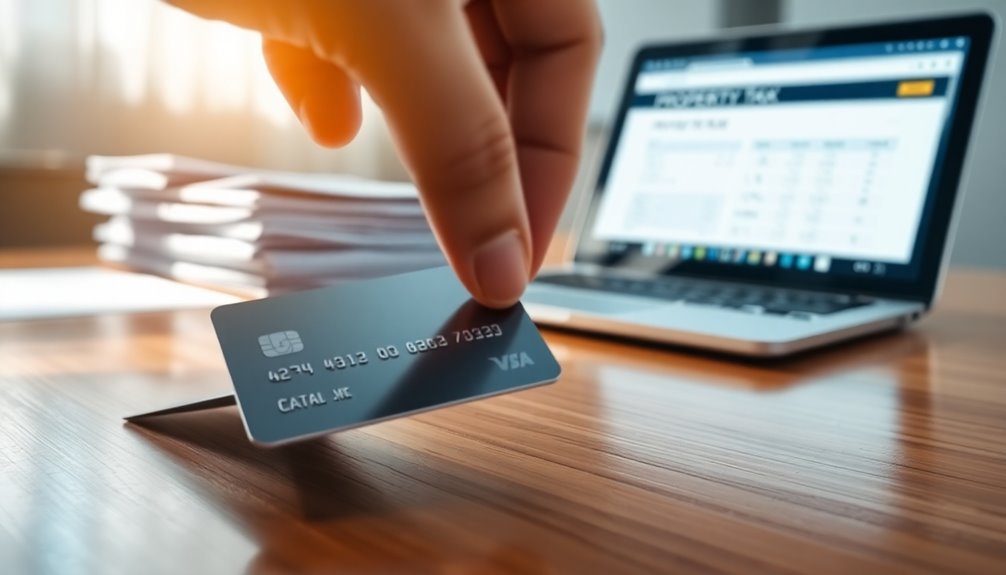
For those looking to pay property taxes, processing payments can be straightforward and flexible. You can choose from several methods, including credit and debit card payments, which you can make online, by phone, or in person.
If you prefer, you can also opt for an electronic check (eCheck) payment, which comes with no extra fees. Keep in mind that there are transaction limits: credit and debit card payments can cap at $99,999.99 or $75,000.00, depending on the method, while eCheck transactions can go up to $2,500,000.00. If your tax amount exceeds these limits, you can make multiple payments to cover the full amount.
When making payments, you'll need your Assessor's Identification Number (AIN) and potentially your property tax bill's year and sequence numbers.
For online payments, logging in or creating an account with the tax department is necessary. Don't forget to provide your billing address and credit card details. Additionally, payments can be completed year-round online, allowing you the convenience to manage your tax obligations at any time.
Payments can be processed 24/7 online, but ensure you complete them before midnight on the due date to avoid penalties. You'll receive a confirmation number, which you can use for tracking.
Jurisdiction-Specific Rules
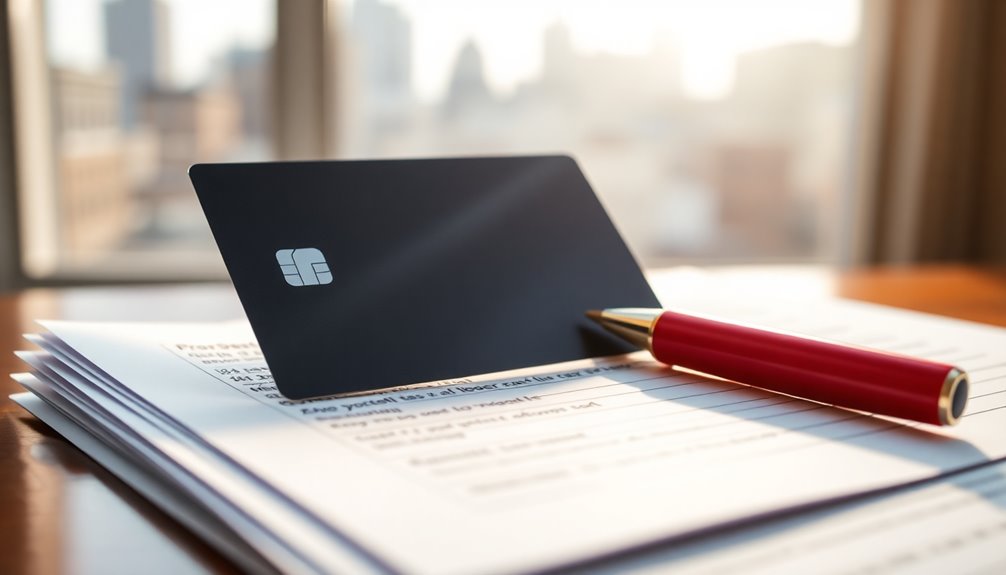
When it comes to paying property taxes, understanding jurisdiction-specific rules is vital. Different areas have varied policies regarding credit card payments, so you need to know the details for your location.
In the District of Columbia, you can use Visa, American Express, MasterCard, or Discover, but there's a $100,000 limit per transaction, and you can only make two transactions per month.
In Monroe County, Indiana, credit card payments aren't accepted for properties eligible for tax sale; you'll need certified funds instead. Online and phone payments are also temporarily unavailable from June 27 to October 9, so plan accordingly. Pay attention to due dates, as they're typically May 10 and November 10.
In Texas, state law mandates that credit card payments be accepted, although local collectors can charge up to 5% in fees. Ensure you check with your local office for any specific options.
Lastly, in Los Angeles County, you can pay online or by phone, but credit/debit transactions are capped at $99,999.99.
Additional Fees and Charges
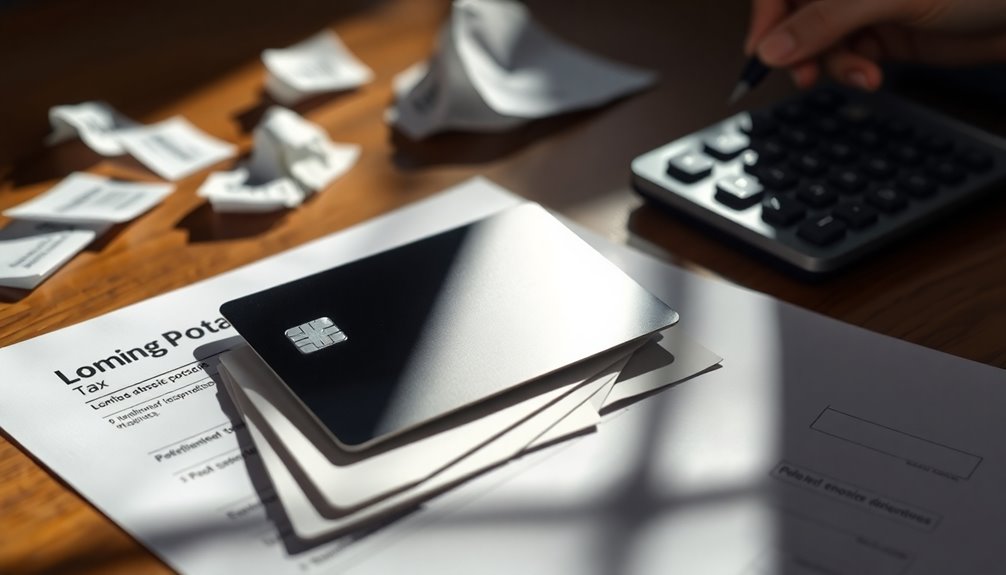
Paying property taxes with a credit card often comes with additional fees that can impact your overall cost. These fees vary by jurisdiction and payment processor, so you'll want to be aware of what's involved before you choose this payment method.
For example, in Orange County, California, you might face a 2.29% fee on your tax amount with a minimum charge of $1.95. Lincoln County imposes a 2.4% fee with a minimum of $1.50. In Texas, you could see 2.25% plus a small processing fee for larger payments.
Even payment processors have their own fees. ACI Payments, Inc. charges 1.98% with a minimum of $2.50, while Pay1040 has a lower rate of 1.87% but the same minimum fee. Additionally, using credit cards for IRS tax payments incurs fees that can vary significantly depending on the processor used.
These costs can add up quickly, potentially offsetting any rewards you might earn from using your card. For instance, if you have a $10,000 tax bill, your net rewards could end up being minimal, around 0.02% to 0.13%.
Always calculate these fees before deciding to pay your property taxes this way.
Record Keeping Practices
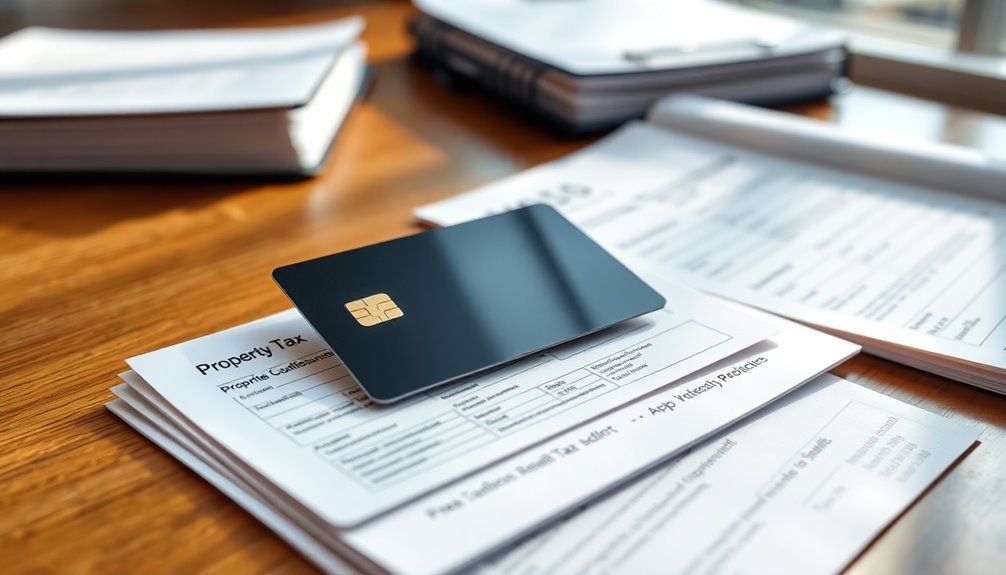
Keeping accurate records is crucial for managing property taxes effectively. You should track the dates and amounts of rent received, as this information is essential for accurate tax calculations and helps you monitor tenant payments. Maintain these records for at least three years after your tax return due date or filing date.
Don't forget about security deposits. Record the amount and date of each deposit, along with any deductions made, and the reasons for those deductions. This practice is vital for resolving disputes. Keep these records for as long as you own the property plus three years.
Additionally, retain copies of rental applications and leases, as they contain important tenant information and lease terms. This documentation is crucial for legal and business disputes.
For property taxes, keep receipts for payments, canceled checks, and related documents, ensuring you can verify every transaction. Store these records for at least seven years. You should also maintain records of deductible expenses related to rental properties, as these can help reduce your tax liability.
Finally, when your retention period ends, securely dispose of paper documents and delete digital files to protect sensitive information. This practice not only protects you but also ensures compliance with data protection regulations.
Best Practices for Payments
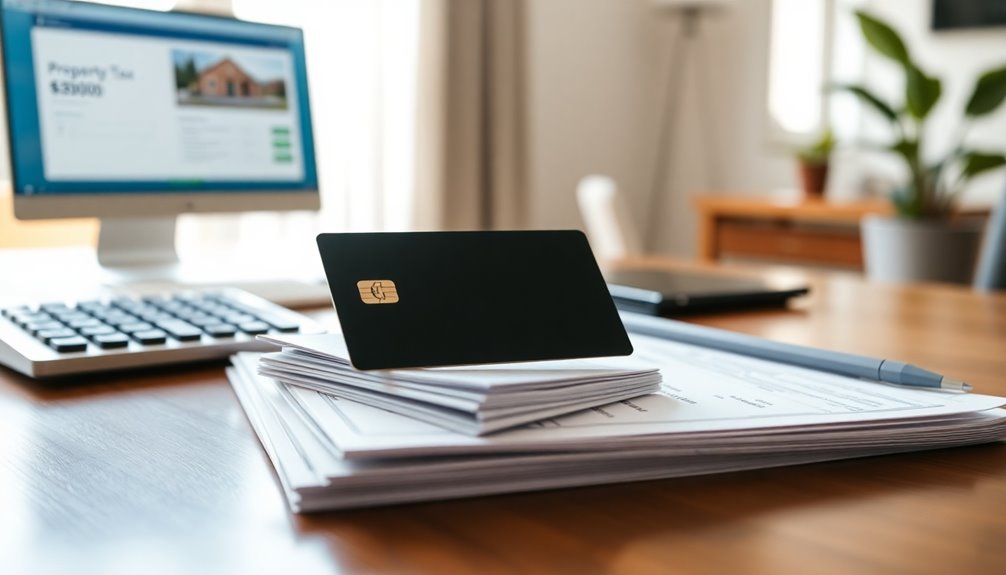
Often, property owners overlook the best practices for making tax payments, which can lead to unnecessary fees or complications.
First, verify with your local tax collector to see if credit card payments are accepted. Identify any approved payment processors and understand the various methods available, whether online or by phone. Make sure your credit card type is accepted and check for any specific restrictions.
When selecting a credit card, look for one that offers rewards or cash back to offset payment costs. Consider cards with 0% APR introductory offers to avoid interest. Compare fees associated with different cards and processors to minimize costs. Ensure your credit limit can cover the property tax amount. Be mindful that only the tax amount should be reported in your tax software, excluding any additional processing fees. Having a solid budget plan can help ensure you have the funds available for your tax payments.
Always pay before the deadline to avoid penalties, and use online portals for convenience. Finally, save your payment confirmation for your records, and consider setting up autopay to ensure timely payments without hassle.
Alternatives to Credit Card Payments

When it comes to property tax payments, you have several alternatives to using a credit card that can save you money and hassle. One option is to utilize online and electronic payments like e-checks, which many localities offer for free. You can also set up electronic funds transfers or use online portals for direct payments from your bank account. Programs like York County's Tax Pay My Way allow for automatic monthly deductions, making it easier to manage your expenses. Additionally, some counties may offer installment payment plans to help spread out the financial burden of property tax payments.
If you prefer traditional methods, mailing a check or money order to your local Treasurer's office is still a viable choice. Many areas have drop boxes for after-hours payments, ensuring you meet deadlines without the hassle.
In-person payments are also available, where you can pay in cash, check, or money order at your local tax office. Some offices may accept credit or debit cards but may charge convenience fees.
Finally, consider installment plans offered by many counties, allowing you to break down your payments into manageable amounts. Always check with your local tax office for specific options and requirements.
Frequently Asked Questions
Can I Use a Prepaid Card to Pay Property Taxes?
You might wonder if you can use a prepaid card to pay property taxes.
While major credit and debit cards are typically accepted, prepaid cards aren't explicitly mentioned.
If your prepaid card has a valid card network, it might work like a debit card, but you should check with your county treasurer's office for specific policies.
Always confirm your prepaid card's balance and any transaction limitations before trying to make a payment.
What Happens if My Credit Card Payment Fails?
If your credit card payment fails, the transaction won't process, leaving your tax bill unpaid.
You'll need to retry the payment or choose another method. Failing to pay on time can lead to penalties and interest, increasing the total amount owed.
You might receive notifications from both your credit card company and the tax authority about the failed payment, and repeated failures could flag your account as suspicious.
Are There Payment Plans Available for Property Taxes?
Yes, there are payment plans available for property taxes.
You can often apply for these plans if you've defaulted on your taxes, but they vary by location. For instance, in some places, you might find five-year or even ten-year plans.
To set one up, you'll need to complete an application and submit it before the deadline. Be prepared to provide documentation and possibly pay a portion of your total amount upfront.
How Long Do I Have to Dispute a Payment?
You've got 60 days from the statement date to dispute a payment.
To start, notify your credit card issuer in writing, including your account details and a description of the error.
They're required to investigate and resolve the dispute within 90 days or two billing cycles, whichever's shorter.
While they're looking into it, you can withhold payment on the disputed amount and any related finance charges.
Can I Receive a Refund if I Overpay My Taxes?
If you've overpaid your taxes, you can receive a refund under certain conditions.
You'll need to identify the error, like incorrect assessments or exemptions not applied, and report it.
In Florida, you must submit the Application for Refund within four years.
In Texas, you've got 90 days for smaller overpayments.
Just ensure you include supporting documents, and keep an eye on jurisdictional rules to avoid missing out on your refund.
Conclusion
In conclusion, while you can often pay property taxes with a credit card, it's essential to weigh the convenience against potential fees. Always check your local jurisdiction's rules and stay aware of any additional charges that might apply. Consider your budgeting and payment practices, as well as alternative payment methods that could save you money. Ultimately, staying informed will help you make the best choice for your financial situation.




